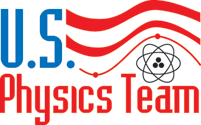
Did you know?
From 1986 to 2017, the United States Teams have brought home: 61 Gold Medals, 43 Silver Medals, 29 Bronze Medals, and 11 Honorable Mentions. — AAPT.ORG
Each year, AAPT and the American Institute of Physics (AIP) sponsor a competition for high school students to represent the United States at the International Physics Olympiad Competition. The mission of the U.S. Physics Team Program is to promote and demonstrate academic excellence through preparation for and participation in the International Physics Olympiad. Photos of the 2017 Team and camp are available on Flickr.
Students outside of the United States wishing to take the F=ma exam PLEASE NOTE:
The F=ma test can be taken by people outside the United States, however there must be a way to verify that the testing center/proctor is legitimate. In the event that the testing center cannot be verified to the satisfaction of the exam coordinator, the F=ma exam will not be sent and AAPT will be under no obligation to refund the test fee. Also NOTE that due to the extra cost of shipping scantrons to other countries, schools outside of the U.S. will need to register for the WebAssign version of the F=ma exam.
The USAPhO is an exam for U.S. residents by invitation. Please note that although we will allow students outside of the U.S. to take the F=ma exam, as of 2017 we are no longer allowing students who are not located in the U.S. to take the USAPhO exam. A cut-off score will be established on the F=ma so that individuals who score at or above the cut-off will be sent an invitation to sit the USAPhO exam. Additional individuals may be invited to sit the exam based on other criteria, even though they did not make the published cut-off score. Approximately four hundred individuals will be invited to sit the USAPhO.
The U.S. Physics Team is a training program for U.S. citizens. Selection for the U.S. Physics Team is by invitation, based primarily on the scores of the USAPhO and F=ma; participants must be eligible and capable of competing at the International Physics Olympiad that year. Obtaining a gold on the USAPhO does not guarantee an invitation to the U.S. Physics Team; some individuals may be invited to the Team who do not obtain a gold. It is expected that members of the U.S. Physics Team will have been attending high school in the U.S. in the academic year that they are selected for the Team. Because of the nature of the training program, members of the U.S. Physics Team can participate in the program at most twice.
Important Dates
December 4, 2017 - F=ma Registration Deadline
January 23 and January 31, 2018 - F=ma Testing Dates (PLEASE NOTE THAT THERE ARE TWO TESTING DATES ONLY)
April 11, 2018 - USAPhO Testing Date (One day only, completed exams will need to be scanned and emailed to AAPT)
May 27 - June 7, 2018 - U.S. Physics Team Training Camp, University of Maryland
July 21-29, 2018 - International Physics Olympiad, Portugal
News
5/21/2018
2018 U.S. Physics Team Announcement
5/16/2018
USAPhO Exam & USAPhO Exam Solutions.
5/11/2018
2018 U.S. Physics Olympiad Medal Ranking List. USAPhO solutions will be posted soon. Certificates will be emailed to the teachers/proctors for the USAPhO exam. U.S. Physics Team Members and bios will be posted soon.
5/11/2018
A listing of students who qualified for the USAPhO can be found by clicking HERE! A certificate for the exam will be emailed to the teachers/proctors.
2/26/2018
The F=ma exam results are available HERE
In order to maintain student privacy, individual scores will not be disclosed to any individual over the phone or by email, students and parents will need to contact their teachers/proctors to find out their scores.
Teachers/proctors will be receiving a separate email by close of business March 2nd, with a password protected link to check student scores.
The teachers/proctors who have student(s) that qualified to take the USAPhO will be receiving an email informing them which of their student(s) have qualified.
A formal listing of students qualifying for the USAPhO exam, and the Medal Ranking for the USAPhO exam will not be posted online until after the USAPhO exam is completed.
2/09/2018
Solutions for the F=ma exams are now available, January 23rd exam solutions HERE, January 31st exam solutions HERE. The solutions for the two exams are also being emailed to the teachers/proctors. Student scores are still being compiled, they should be available by the last week of February, and will be emailed to the exam proctors. Student scores will not be given out over the phone at the AAPT office, students and parents will need to contact their teachers/proctors to find out their scores.
Contact Information
For more details and information about the U.S. Physics Team, please contact AAPT's Programs department at 301-209-3340 or programs@aapt.org

